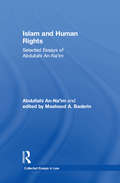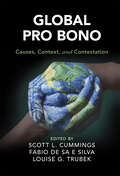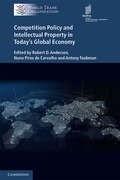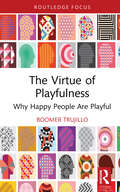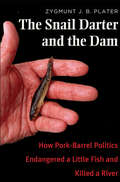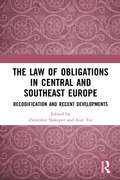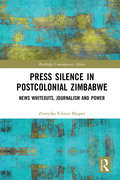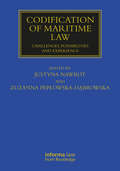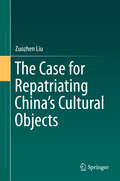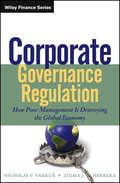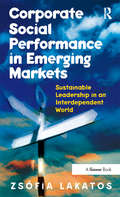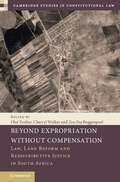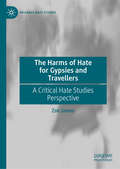- Table View
- List View
Islam and Human Rights: Selected Essays of Abdullahi An-Na'im (Collected Essays in Law)
by Abdullahi An-Na'im edited by BaderinThe relationship between Islam and human rights forms an important aspect of contemporary international human rights debates. Current international events have made the topic more relevant than ever in international law discourse. Professor Abdullahi An-Na'im is undoubtedly one of the leading international scholars on this subject. He has written extensively on the subject and his works are widely referenced in the literature. His contributions on the subject are however scattered in different academic journals and book chapters. This anthology is designed to bring together his academic contributions on the subject under one cover, for easy access for students and researchers in Islamic law and human rights.
Global Pro Bono: Causes, Context, and Contestation
by Scott L. Cummings Louise G. Trubek de Sa e Silva, FabioThe principle and practice of pro bono, or volunteer legal services for poor and other marginalized groups, is an increasingly important feature of civil justice systems around the world. Recent surveys have identified pro bono initiatives in more than eighty countries—including Colombia, Portugal, Nigeria, and Singapore—and the list keeps growing. Covering the spread of pro bono in across five continents, this book provides a unique comparative dataset permitting the first-ever analysis of pro bono's growing role in access to justice globally. The contributors are leading experts from around the world, whose chapters explore both the internal roots of and global influences on pro bono in transnational context. Global Pro Bono explores the dramatically expanding geographical and political reach of pro bono: documenting its essential contribution to bringing more justice to those on the margins, while underscoring its complex and contested meaning in different parts of the world.
Competition Policy and Intellectual Property in Today's Global Economy
by Robert D. Anderson Antony Taubman de Carvalho, Nuno PiresThe fast-evolving relationship between the promotion of welfare-enhancing competition and the balanced protection of intellectual property (IP) rights has attracted the attention of policymakers, analysts and scholars. This interest is inevitable in an environment that lays ever greater emphasis on the management of knowledge and innovation and on mechanisms to ensure that the public derives the expected social and economic benefits from this innovation and the spread of knowledge. This book looks at the positive linkage between IP and competition in jurisdictions around the world, surveying developments and policy issues from an international and comparative perspective. It includes analysis of key doctrinal and policy issues by leading academics and practitioners from around the globe and a cutting-edge survey of related developments across both developed and developing economies. It also situates current policy developments at the national level in the context of multilateral developments, at WIPO, WTO and elsewhere.
The Virtue of Playfulness: Why Happy People Are Playful (Routledge Focus on Philosophy)
by boomer trujilloThis book argues that in order for people to live well, they must develop a virtue of playfulness. Inspired by Aristotle, the book draws on work from philosophy, classics, history, biology, psychology, and media studies to understand the place of play and playfulness in a good life.Many philosophers have written about play, from Presocratics such as Heraclitus to contemporary philosophers such as Bernard Suits. Some champion play as the most crucial value in life. Others deride it and warn strongly against it. This book evaluates the research on how play and playfulness bear on living a good life and becoming a good person. Its main argument is that in order to understand play as an action, we must understand playfulness as a virtue in the lives of good people. The author develops a theory of playfulness from an Aristotelian perspective. Like Aristotle sees the virtues as necessary for a happy life, the author argues that playfulness is necessary for living well. And just as Aristotle offers multifaceted characterizations of core virtues, the author argues that playfulness includes aspects of seriousness, creativity, humility, optimism, and sociality. Playful people take play seriously, learn new skills, overcome failure, strive for success, and keep others in mind. As a result, playful people have a better shot at living well.The Virtue of Playfulness is an accessible, empirically informed, and detailed treatment of the philosophy of playfulness. It will appeal to scholars and students in philosophy and related disciplines who are interested in virtue ethics, moral psychology, philosophy of games, philosophy of sport, and ancient philosophy.
Disagreements of the Jurists: A Manual of Islamic Legal Theory (Library of Arabic Literature #22)
by al-Qāḍī al-NuʿmānA masterful overview of Islamic law and its diversityAl-Qadi al-Nu'man was the chief legal theorist and ideologue of the North African Fatimid dynasty in the tenth century. This translation makes available for the first time in English his major work on Islamic legal theory (usul al-fiqh), which presents a legal model in support of the Fatimid claim to legitimate rule.Composed as part of a grand project to establish the theoretical bases of the official Fatimid legal school, Disagreements of the Jurists expounds a distinctly Shi'i system of hermeneutics. The work begins with a discussion of the historical causes of jurisprudential divergence in the first Islamic centuries and goes on to engage, point by point, with the specific interpretive methods of Sunni legal theory. The text thus preserves important passages from several Islamic legal theoretical works no longer extant, and in the process throws light on a critical stage in the development of Islamic legal theory that would otherwise be lost to history.An English-only edition.
Disagreements of the Jurists: A Manual of Islamic Legal Theory (Library of Arabic Literature #53)
by al-Qāḍī al-NuʿmānA masterful overview of Islamic law and its diversityAl-Qadi al-Nu'man was the chief legal theorist and ideologue of the North African Fatimid dynasty in the tenth century. This translation makes available in English for the first time his major work on Islamic legal theory, which presents a legal model in support of the Fatimids’ principle of legitimate rule over the Islamic community. Composed as part of a grand project to establish the theoretical bases of the official Fatimid legal school, Disagreements of the Jurists expounds a distinctly Shi'i system of hermeneutics, which refutes the methods of legal interpretation adopted by Sunni jurists. The work begins with a discussion of the historical causes of jurisprudential divergence in the first Islamic centuries, and goes on to address, point by point, the specific interpretive methods of Sunni legal theory, arguing that they are both illegitimate and ineffective. While its immediate mission is to pave the foundation of the legal Isma'ili tradition, the text also preserves several Islamic legal theoretical works no longer extant—including Ibn Dawud’s manual, al-Wusul ila ma'rifat al-usul—and thus throws light on a critical stage in the historical development of Islamic legal theory (usul al-fiqh) that would otherwise be lost to history.A bilingual Arabic-English edition.
The Snail Darter and the Dam
by Zygmunt Jan PlaterEven today, thirty years after the legal battles to save the endangered snail darter, the little fish that blocked completion of a TVA dam is still invoked as an icon of leftist extremism and governmental foolishness. In this eye-opening book, the lawyer who with his students fought and won the Supreme Court case--known officially as Tennessee Valley Authority v. Hill--tells the hidden story behind one of the nation's most significant environmental law battles.The realities of the darter's case, Plater asserts, have been consistently mischaracterized in politics and the media. This book offers a detailed account of the six-year crusade against a pork-barrel project that made no economic sense and was flawed from the start. In reality TVA's project was designed for recreation and real estate development. And at the heart of the little group fighting the project in the courts and Congress were family farmers trying to save their homes and farms, most of which were to be resold in a corporate land development scheme. Plater's gripping tale of citizens navigating the tangled corridors of national power stimulates important questions about our nation's governance, and at last sets the snail darter's record straight.
Environmental Law and Policy: Nature, Law, and Society (Aspen Casebook)
by Lisa Heinzerling Zygmunt J. B. Plater Robert H. Abrams Robert L. Graham David A. Wirth Noah D. HallEnvironmental Law & Policy: Nature, Law & Society is a coursebook designed to access the law of environmental protection through a “taxonomic” approach, exploring the range of legal structures and legal methodologies of the field—rather than simply designing it according to air, water, toxics, etc. as subject media (which often results in duplicative legal coverage). All the major subject areas of pollution and resource conservation are covered, but they are covered according to the legal approaches they represent. <p><p> The book is “Saxist,” because it originally arose and continues to carry on themes from the teaching, guidance, and writings of the late Joseph Sax, the eminent pioneer of the environment law field who emphasized the interaction between common law and public law statutory structures, and introduced the public trust doctrine as a thread undergirding and running through the entire field of environmental law.
Does Ethics Have a Chance in a World of Consumers? (Institute for Human Sciences Vienna Lecture Series)
by Zygmunt BaumanZygmunt Bauman is one of the most admired social thinkers of our time. Once a Marxist sociologist, he has surrendered the narrowness of both Marxism and sociology, and dares to write in language that ordinary people can understand—about problems they feel ill equipped to solve. This book is no dry treatise but is instead what Bauman calls “a report from a battlefield,” part of the struggle to find new and adequate ways of thinking about the world in which we live. Rather than searching for solutions to what are perhaps the insoluble problems of the modern world, Bauman proposes that we reframe the way we think about these problems. In an era of routine travel, where most people circulate widely, the inherited beliefs that aid our thinking about the world have become an obstacle. Bauman seeks to liberate us from the thinking that renders us hopeless in the face of our own domineering governments and threats from unknown forces abroad. He shows us we can give up belief in a hierarchical arrangement of states and powers. He challenges members of the “knowledge class” to overcome their estrangement from the rest of society. Gracefully, provocatively, Bauman urges us to think in new ways about a newly flexible, newly challenging modern world. As Bauman notes, quoting Vaclav Havel, “hope is not a prognostication.” It is, rather, alongside courage and will, a mundane, common weapon that is too seldom used.
The Law of Obligations in Central and Southeast Europe: Recodification and Recent Developments
by Zvonimir Slakoper; Ivan TotThe Law of Obligations in Central and Southeast Europe examines the new codifications, reforms, and other recent developments in Central and Southeast Europe which have significantly modernized the law of obligations in the last two decades, focusing particularly on the legal systems of Poland, Czech Republic, Slovak Republic, Hungary, Slovenia, Croatia, Serbia, and Turkey. With chapters authored by prominent academics and promising young legal scholars, this book discusses the results of the modernizations and describes the legislative reforms of the law of obligations that are underway or are discussed and advocated for in the countries of Central and Southeast Europe. Divergences of the new civil codes and other legislative acts from earlier legal solutions are identified and the rationale behind these departures is analysed, as well as the introduction of the new legal institutes in the law of obligations in these parts of the world. The Introduction provides a concise country-by-country overview of the recodification, modernization, and reform of the law of obligations in Central and Southeast Europe. In Part I, chapters discuss the process of recodification in the Slovak Republic, Czech Republic, Poland, and Hungary, with focus on the main novelties in their contract and tort law. The chapters in Part II then discuss several, more specific legal institutes of the law of obligations, and other recent developments and contemporary challenges to the law of obligations in the Czech Republic, Slovenia, Croatia, Serbia, and Turkey. This book is of interest to legal scholars in the field of private law, as well as to students, practitioners, members of law reform bodies, and civil servants in Central and Southeast Europe, and beyond.
Digital Technologies and the Law of Obligations
by Zvonimir Slakoper Ivan TotDigital Technologies and the Law of Obligations critically examines the emergence of new digital technologies and the challenges they pose to the traditional law of obligations, and discusses the extent to which existing contract and tort law rules and doctrines are equipped to meet these new challenges. This book covers various contract and tort law issues raised by emerging technologies – including distributed ledger technology, blockchain-based smart contracts, and artificial intelligence – as well as by the evolution of the internet into a participative web fuelled by user-generated content, and by the rise of the modern-day collaborative economy facilitated by digital technologies. Chapters address these topics from the perspective of both the common law and the civil law tradition. While mostly focused on the current state of affairs and recent debates and initiatives within the European Union regulatory framework, contributors also discuss the central themes from the perspective of the national law of obligations, examining the adaptability of existing legal doctrines to contemporary challenges, addressing the occasional legislative attempts to deal with the private law aspects of these challenges, and pointing to issues where legislative interventions would be most welcomed. Case studies are drawn from the United States, Singapore, and other parts of the common law world. Digital Technologies and the Law of Obligations will be of interest to legal scholars and researchers in the fields of contract law, tort law, and digital law, as well as to legal practitioners and members of law reform bodies.
EU Private Law and the CISG: The Effects for National Law
by Zvonimir Slakoper Ivan TotEU Private Law and the CISG examines selected EU directives in the field of private law and their effects on the national private law systems of several EU Member States and discusses certain specific concepts of the United Nations Convention on Contracts for the International Sale of Goods (CISG) in light of the CISG’s recent fortieth anniversary. The most prominent influence of EU law on national private law systems is in the area of the law of obligations, thus the book focuses on several EU private law directives that cover the issues belonging to contract and tort law, as interpreted in the case law of the Court of Justice of the EU. EU private law concepts need to be interpreted autonomously and uniformly rather than through the lens of national private law systems. The same is true for the CISG which has not only been one of the most successful instruments of the international trade law unification but had also influenced both the EU private law and domestic laws. In Part I, focused on the EU private law and its effects for national laws, chapters examine the recent Digital Content and Services Directive and its likely impact on the contract law of the UK and Ireland, the role aggressive commercial practices play in EU banking and credit legislation, the applicability of the EU private international law rules to collective redress, the unfair contract terms regime of the Late Payment Directive and its transposition into Croatian law, the implementation of the Commercial Agency Directive in Denmark, Estonia and Germany, and disgorgement of profits as remedy provided in the Trade Secrets Directive. In Part II, dealing with selected CISG issues, chapters discuss the autonomous interpretation of CISG’s concept of sale by auction and its notion of intellectual property, as well as the CISG’s principle of freedom of form and the possibility for reservations with the effect of its exclusion. The book will be of interest to legal scholars in the field of EU private law and international trade law, as well as to the students, practitioners, members of law reform bodies, and civil servants in Europe, and beyond.
Intimate Violence Across the Lifespan
by Tova Band-Winterstein Zvi EisikovitsEvidence pertaining to continual violence throughout the life cycle coupled with the experience of growing old in a life permeated by intimate violence is scarce. And the focus is usually on the victims usually, the older, battered women and seldom on their aging partners or adult children who were part and parcel of the violent dynamics in the family system. With the increase in longevity and the older population's subsequent growth in size, the number of elderly couples living and aging in long-lasting conflictive relationships is on the rise. The relatively intense preoccupation with elder abuse in the gerontological literature in recent years has not specifically addressed long-term intimate violence among the old adults and its lasting consequences. Similarly, the literature on intimate intergenerational relationships in old age has usually focused on normative exchanges between partners and their extended family, including their adult children. Therefore, conflictive relationships, and particularly violent ones, have also fallen outside the scope of this body of research. This volume describes and analyzes the various perspectives of family members concerning life, and particularly old age, in the shadow of long-term intimate violence. It explores how people make sense out of living and aging in violence, how interpersonal, familial and cross-generational relationships are perceived and reconstructed and how "we-ness" is achieved, if at all, in such families.
Circular Migration and the Rights of Migrant Workers in Central and Eastern Europe: The EU Promise of a Triple Win Solution (IMISCOE Research Series)
by Zvezda VankovaBy adopting a rights-based approach, this open access book sheds light on the different legal and policy instruments that have been adopted to implement circular migration policies in the EU and their consequences for the rights of migrant workers. It contributes to the understanding of the meaning of this concept in general, in the EU, as well as more specifically with regard to its Eastern neighbourhood. The book provides a comprehensive overview of the formation and implementation of the EU’s circular migration approach that has developed through both EU and national instruments on the basis of comparative case study analysis of Bulgaria and Poland’s migration law and policy. Furthermore, by applying legal empirical research methods, it draws conclusions about the policy outcomes from the implementation of the various migration instruments falling under the circular migration umbrella and shows the consequences for the rights of migrant workers as a result of the application of different policy options.Along with its value to an academic audience, the book can be used by policy makers at the EU, international and national level as well as international organisations and NGOs working in the field of migration law and policy.
Press Silence in Postcolonial Zimbabwe: News Whiteouts, Journalism and Power (Routledge Contemporary Africa)
by Zvenyika Eckson MugariThis book focuses on news silence in Zimbabwe, taking as a point of departure the (in)famous blank spaces (whiteouts) which newspapers published to protest official censorship policy imposed by the Rhodesian government from the mid-1960s to the end of that decade. Based on archived news content, the author investigates the cause(s) of the disappearance of blank spaces in Zimbabwe’s newspapers and establishes whether and how the blank spaces may have been continued by stealth and proposes a model of doing journalism where news is inclusive, just and less productive of blank spaces. The author explores the broader ramifications of news silences, tacit or covert on society’s sense of the world and their place in it. It questions whether and how news media continued with the practice of epistemic deletions and continue to draw on the colonial archive for conceptual maps with which to define and interpret contemporary postcolonial realities and challenges in Zimbabwe. This book will be of interest to scholars, researchers and academics researching the press in contemporary Africa, critical media analysis, media and society studies, and news as discourse.
Codification of Maritime Law: Challenges, Possibilities and Experience (Maritime and Transport Law Library)
by Justyna Nawrot Zuzanna Pepłowska-DąbrowskaThis book is the first of its kind to explore the problems inherent in the unification of maritime law. Featuring contributions from leading experts at European maritime law research centres, it considers international conventions, current maritime practice, standard forms and recently adopted or drafted national codifications of maritime law from the codification point of view. The book is divided into four parts which represent different views on the main topic. Part I gathers chapters dedicated to different aspects and methods of unification of maritime law on a global scale, as well as several specific issues of maritime law from the regulatory point of view. Part II of the book consists of those papers that centre around the issue of transport of goods. Part III is dedicated to codifications of carriage of passengers, cruise law and leisure navigation. Finally, Part IV addresses national codifications of maritime law. Codification of Maritime Law: Challenges, Possibilities and Experience seeks to provide common ground for future unification of maritime law, which makes the book useful both for private and public maritime lawyers and states’ maritime administrations worldwide.
The Case for Repatriating China's Cultural Objects
by Zuozhen LiuThis book investigates China's demands for the repatriation of Chinese cultural relics 'lost' during the country's modern history. It addresses two main research questions: Can the original owners, or their rightful successors, of cultural objects looted, stolen, or illicitly exported before the adoption of the 1954 Hague Convention and the 1970 UNESCO Convention reclaim their cultural objects pursuant to remedies provided by international or national law? And what are the philosphical, ethical, and cultural considerations of identity underlying the international conventions protecting cultural objects and claims made for repatriating them? The first part of the book explores current positive legal regimes, while the second part focuses on the philosphical, ethical, and cultural considerations regarding repatriation of cultural objects. Consisting of seven chapters and an introduction, it outlines the loss of Chinese cultural relics in modern history and the normative framework for the protection of cultural heritage. It presents case studies designed to assess the possibility of seeking legal remedies for restitution under contemporary legal regimes and examines the cultural and ethical issues underpinning the international conventions protecting cultural heritage and claims for the repatriation of cultural heritage. It also discusses issues of cultural identity, the right to cultural identity and heritage, multiculturalism, the politics of recognition, cosmopolitanism, the right to cultural heritage, and other related issues. The concluding chapter answers the two research questions and offers suggestions for future research.
The Two-level Games in China’s Foreign Trade Policies
by Zuozhen LiuApplying two-level game theory and rational decision-making analysis, this book explores how China navigates domestic constraints and international pressures to achieve optimal outcomes in its foreign trade policy.The author examines China’s accession to the WTO and the evolving trade tensions between China and the US. She analyzes some of the most contentious trade issues in the contemporary landscape, such as China’s economic model, technology restrictions, and non-tariff barriers. Through a case study on China’s solar photovoltaic (PV) manufacturing sector, she illustrates how these trade issues influence policy-making within a specific industry. In conclusion, the book evaluates China’s strategies for navigating its foreign trade within the broader global trading system – it considers the prospects for a potential "win-set" in future trade negotiations, offering insights into how China might navigate these complexities moving forward.The book will appeal to academics specializing in international trade law, international relations, and China studies.
Corporate Governance Regulation
by Nicholas V. Vakkur Zulma J. HerreraWhy U.S. corporate governance regulation has lost its way, and what must be done to improve itModern history persuasively demonstrates the inexorable link that binds comprehensive regulation to the global economy. This important book, rather than simply recount a litany of corporate governance failures, persuasively explains why, despite policymakers' best intentions, regulation has failed in the modern era. An objective study intended for a diverse readership, Corporate Governance Regulation unveils the underlying, root causes of regulatory failure. The result: A compelling and original analysis, broadly suited for a global audience of all backgrounds.Written by published, subject-area experts, the authors carefully delineate how U.S. corporate governance regulation, beginning with Sarbanes Oxley, lacks an adequate rational basis, as may be attributed to a non-existent policy dialogueThe witnessed result: A conspicuous lack of regulatory efficacy, enormous costs, coupled with paltry benefitsThe focus is upon reigniting a stalled, non-productive policy dialogue, by eschewing stale, overly-polemicized arguments, as needed to develop a common groundDrawing from an eclectic, analytic framework, governance experts Nicholas Vakkur and Zulma Herrera offer both the professional and global citizen alike a multi-dimensional understanding of issues critical to global economic health. Nuanced and persuasively argued, Corporate Governance Regulation represents a formidable catalyst in the elusive, ongoing quest for global economic stability.
Corporate Social Performance in Emerging Markets: Sustainable Leadership in an Interdependent World
by Zsófia LakatosWhen it comes to perceptions of what is a sustainable economy and how it may be realised, companies expanding into Central and Eastern European markets face the challenge of diverse people, attitudes and history. Corporate Social Performance in Emerging Markets provides an effective tool for companies to help them engage in CSR activities and become a responsible company in CEE countries such as Poland, Hungary, the Czech Republic, Slovakia, Croatia and Slovenia. It does this by enabling them to focus on the difference of stakeholders and their attitudes to those of Western Europe. The author, Zsófia Lakatos, provides a review of the major differences between the various CEE countries, supported by interview research from leading executives in some of the blue-chip companies already operating in the region.
Rape on Trial (Routledge Revivals)
by Zsuzsanna AdlerFirst published in 1987, Rape on Trial investigates the impact of the Sexual Offences (Amendment) Act, 1976 and considers the treatment of rape victims by the courts in United Kingdom. Extracts from trials are used extensively, and the author examines in particular: how the anonymity provisions have worked out in practice; how far the victim’s previous sexual history is brought up in court; how far she is held to be responsible for her victimisation; ways in which the validity of her complaint is questioned in court; and defence strategies to present her as a legitimate victim. Also included are a critical discussion of the controversial question of sentencing for rape, and new proposals for legislative and procedural change. Extremely pertinent to current times, this book will be of interest to students of law, criminology, sociology as well as to any concerned citizen.
Beyond Expropriation Without Compensation: Law, Land Reform and Redistributive Justice in South Africa (Cambridge Studies in Constitutional Law)
by Olaf Zenker Cherryl Walker Zsa-Zsa BoggenpoelSpeeding up land reform through a constitutional amendment that would explicitly permit the expropriation of land without compensation has dominated legal and political-policy debates in South Africa in recent years. Taking this politically and emotionally charged issue as its starting point, this volume offers both expert commentary on this issue from a variety of disciplinary perspectives and also fresh ideas on how to advance the redistributive transformation that South Africa so urgently needs. It brings critically important debates around transformative property law, the need for diversified land justice and the possibilities of alternative forms of redistribution into productive conversation with each other. While grounded in the complex realities of South Africa's past and present, the volume speaks to concerns that resonate in many contexts in the Global South and beyond. It will appeal to scholars, students, policymakers and general readers concerned with both the theory and practice of redistributive justice. This title is also available as Open Access on Cambridge Core.
Human Rights Compliance in Europe: The Local Politics of Culture and Legitimacy
by Zoë JayThe European Court of Human Rights depends on the good faith cooperation of its members to implement judgement and maintain legitimacy, but how this translates into compliance varies both across and within states. This book presents an innovative framework for understanding how local cultures dynamically shape states’ ideas about what is and is not legitimate in international human rights regimes. The book investigates compliance as a product of cultural politics. Case studies from the United Kingdom, Germany, and Croatia reveal how states rely on local understanding of human rights and law to deal not only with compliance ‘sticking points’ but also to evaluate the legitimacy of the European human rights system as a whole.
The Harms of Hate for Gypsies and Travellers: A Critical Hate Studies Perspective (Palgrave Hate Studies)
by Zoë JamesGypsies and Travellers have often been overlooked as victims of hate crime and discrimination. This book redresses that exclusion by shining a light on the harms of hate experienced by Gypsies and Travellers in the UK. In doing so James explores how hate permeates all aspects of their lives and identifies the hate crimes, incidents, and speech that they are subject to. It goes on to explore how hate against Gypsies and Travellers occurs as discrimination, social exclusion and criminalisation and how that hate is embedded within the language and practice of neoliberal capitalism. This book provides new insights to critical criminology and ways of understanding hate by using the critical hate studies perspective to gain a full appreciation of the harms of hate. As a consequence of this, the book is able to do justice to Gypsies' and Travellers' experiences of hate by extrapolating how harms manifest and the impact they have on Gypsies’ and Travellers’ social and personal identities. The book explains and acknowledges how hate harms imbue Gypsies' and Travellers' daily lives, including common events of serious abuse and assault, regular ill-treatment in provision of services, and everyday micro-aggressions. It argues hate experienced by Gypsies and Travellers can only be fully recognised through an analysis of the neoliberal capitalist context within which it occurs and the harmful subjective experience it engenders. The author’s expertise in this area, having carried out research with Gypsies and Travellers for 25 years, underpins the book with excellent empirical knowledge and research-informed discussion.
India's Living Constitution
by Zoya Hasan . E. Sridharan . R. SudarshanThis volume originated in the felt need for an exploration of the terms of discourse in Indian constitutionalism and politics at the turn of the century and millennium, the completion of fifty years of the existence of the Indian constitution, and a little over half a century of Indian independence.
